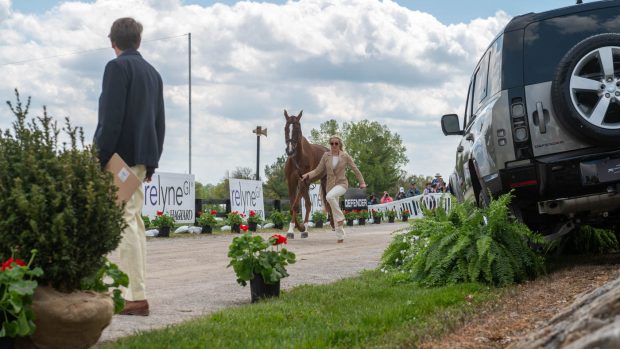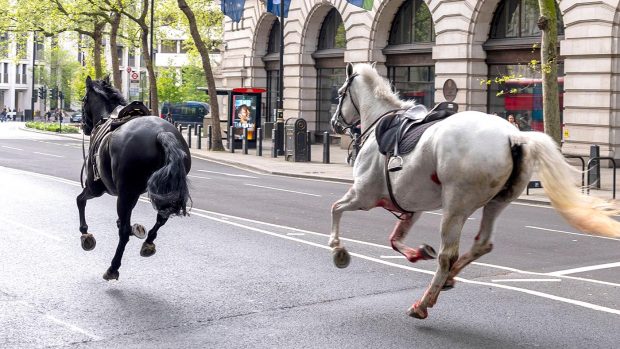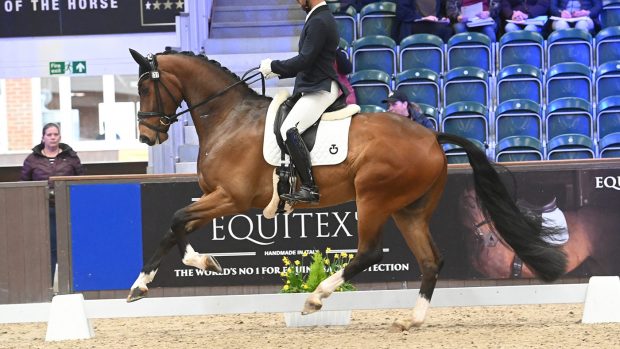A rider who suffered a mini stroke in February has achieved her goal of getting back in the saddle and competing – at a show she said epitomises the very best of the horse world.
Rebecca Stevens was diagnosed with functional neurological disorder (FND) some months after she suffered the transient ischaemic attack (TIA) at the age of 24.
This condition, which affects the functioning of the nervous system and how the brain and body send and receive signals, means the mobility in her legs has been severely affected, among a number of other symptoms.
“My goal was always to get back in the saddle,” said Rebecca, who was born and brought up hunting and riding with the Pony Club in Wales. “I managed that thanks to my brilliant horse whom I’ve had for 11 years but I genuinely thought my competition days were over.”
Rebecca told H&H she moved to Reading to go to university, and stayed there after her course, moving her part-bred Connemara and “best friend” Steel to live nearby. She was fit, active and healthy, so the TIA came as a shock.
“I was at the yard when it happened,” she said. “I’d been feeling really unwell for a week or two but thought I was just stressed. We were riding and I remember the school started spinning, so I just said Steel felt a bit tired and got off.
“I got back to the stables, somehow. I texted my dad and flatmate saying ‘Help’, but I don’t remember, and I must have taken Steel’s tack off but the next thing, thank goodness, a lovely lady called Vicky found me, lying face-down in the straw.”
Rebecca was taken to hospital, “and the rest is history, really”, she said.
Her mobility, memory and speech were severely affected, and after she started suffering seizures, the FND was diagnosed, thought to be a result of the TIA.
“Since then I’ve had muscle trauma and limb weakness; I often can’t feel below my knees,” she said. “I’m exhausted all the time, I have muscle aches and if I have a seizure, I’m out for a while, but my goal was to get back in the saddle; I wanted to ride so badly.”
Rebecca cited the support of the “amazing” people at her yard.
“Especially Sally, who looked after Steel; I thought I’d have to pay loads but she just said she’d look after him and I should concentrate on my recovery,” she said. “I started riding again, with people around me, three or four months ago, and it was amazing.
“When I’m riding, I feel normal and free again; Steel becomes my legs. Even if I can’t feel my own and I’m exhausted, he’s become so much better behaved. He’s so patient and it’s like he knows.”
Rebecca has persevered, although at first riding always triggered a seizure, and her legs would be “like jelly for a couple of days”.
“But I’m getting there,” she said. “My goal was to get back in the saddle, and with the help and support of everyone, I got there. Competing seemed like a crazy dream — but then I stumbled across an ad for a Garth Hunt branch Pony Club dressage show at Berkshire College of Agriculture, with a walk-trot test. I spoke to my mum and instructor, who both said ‘Do it!’. They both said just getting to the venue would be a massive achievement. It wasn’t the Olympics, but it felt like it to me.”
Rebecca said her perspective on life has changed in the past 10 months.
“When you become disabled — although I don’t like using that word, but I suppose I’m a para rider now — it changes your perception of everything,” she said. “Everything shifts and you become grateful for the smallest things, and I’m not afraid to admit I was petrified about going to the event. What would people think, of an adult doing a walk-trot test at a Pony Club show? I love the horse word but sometimes it has a nasty side.”
The situation did not look promising, when a “massive red brake warning light” appeared in Rebecca’s mother’s car.
“I was crying saying it was all over but Mum said ‘We’ll get you there, even if I have to borrow an ex-boyfriend’s car’!” Rebecca said. “In the end, her sister said we could take her lorry so Mum picked it up at about 5am. She hadn’t driven a lorry for about 30 years and Steel had never been in one, we couldn’t get anything to work and it was all falling apart.”
But they got there, and organisers said there was still time for Rebecca to compete. Others at the show noticed, and came to help.
“Everyone — competitors, Pony Club mums, stewards, organisers — was so kind, helpful and welcoming,” Rebecca said. “I can’t begin to express the difference it made. They didn’t know what had happened, they were just being genuine. My mum was calling my test as I get brain fog but she’s not great at dressage, and another mum saw us struggling and offered to read the test for us. I was crying because I was so happy.”
Rebecca said people were clapping and cheering as she finished.
“Every single person was so supportive and kind and welcoming,” she said. “It’s what it all should be about. It was only a walk-trot test but doing it, and in that atmosphere, was a game-changer. It could have been a completely different experience.”
Rebecca added that she has been behind the scenes at shows and knows the “blood, sweat and tears” involved, which made her appreciate people’s kindness even more.
“How it was should be the norm but it should be recognised that there are lovely people out there and whatever you look like, or what disability you have, you can still have fun and be in such a positive atmosphere with horses,” she said. “I may not have straight legs or a stable body any more and my core muscles are obliterated but this was what horses should be about, the love of the sport and the support that I felt.”
Rebecca now plans to compete again, and would love also to return to the hunting field, “even just to do one line”.
“This won’t ever go away but rather than looking at it as a disability, and at what I can’t do, I set goals; I still love my horse and want to do things,” she said. “I’m still coming to terms with it; I still cry and get angry, but the main thing is to be positive, and I hope to keep competing. You’ve got to find something to get you up and be a focus. I didn’t think any of this would be possible so I’ve already exceeded my expectations.
“You have to make all sorts of adjustments and it’s hard but for those two minutes in the ring, it’s worth everything.”
You might also be interested in:

Rider overcomes effects of a stroke at age 31 to jump 1.40m class at Hickstead
“I had always thought you have a stroke and that’s a one-off and you’re back to normal”

‘She’s been through hell and back’: young rider takes on illness and beats bullies to run successful business

5 reasons why a subscription to HorseandHound.co.uk makes the perfect last-minute gift
Horse & Hound magazine, out every Thursday, is packed with all the latest news and reports, as well as interviews, specials, nostalgia, vet and training advice. Find how you can enjoy the magazine delivered to your door every week, plus options to upgrade your subscription to access our online service that brings you breaking news and reports as well as other benefits.





